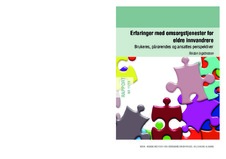| dc.description.abstract | The aim of this report is to describe experiences from care services for elderly immigrants from the perspectives of users, family caregivers and staff, and point to cooperation and challenges in formal vs. informal care. The study is part of a broader project «Care Services for elderly immigrants» at Norwegian Social Research, Norway. The project is financed by the Department of Integration and Diversity, Ministry of Labour and Social Inclusion, now organised under The Royal Ministry of Children, Equality and Social Inclusion. Methods and material: A sample of care service staff, elderly users in nursing homes and day care centres and their family members are interviewed about their experiences, expectations and challenges regarding adaptation and cooperation. The elderly (n=14) have varied residence time in Norway and cultural background from Asia, Africa and Southern America. The staff is multicultural as well, just half of them are born in Norway. The material consists of more than forty qualitative interviews all together. User perspectives: The perspectives of the elderly users vary with respect to their needs and wishes for adaptation of services. The expectations of the elderly and their family carers toward the formal care systems are often expressed as ordinary wishes for caregiver stability, reliable appointments and staff-cooperation, together with culturally adapted care related to customs and cultural norms for cuisine, gender and intimacy. Respectful attitudes by staff and opportunity to speak their native tongue are on the list of wants. Some of the care receivers are unable to express their needs verbally in any language. The combined knowledge and sensitivity of family caregivers and staff are crucial to take the users needs into consideration. Some of the respondents would have preferred multicultural care units, but most prefer adapted services in general units. Staff: Individualized, tailor-fit care is a central motto for staff. Information, staff training and enough time are decisive factors mentioned to be able to care with respect and dignity. A multicultural staff may ease the process. They need a work-arena with a common language (Norwegian), openness, cooperation and competence building. Family carers: Family carers often tell stories of family care long before they reach out for formal care. They are ‘pioneers’ as family carers in cooperation with the formal care system to give the elderly immigrants in Norway proper care and services. Family-carers often have strong filial responsibility that is difficult to live up to when it comes to extensive personal care. Even though, family carers may restrict their expression of their own needs in relation to the extended family network. In relation to staff, family members often have a ‘go-between role’ as translators and cultural mediators. Not all elderly immigrants have close relatives. Family members are often at different points in the process regarding social obligations in the original and new culture. Different positions and expectations may cause conflicts and dilemmas. Cooperation between staff and family: Cooperation between staff and the families of elderly immigrants is important to get to know the person and cultural norms, to have a dialog, discuss dilemmas, share considerations about treatment and make agreements of proper care and confirmation. The interviews illustrate different patterns of expectations and processes of cooperation between the care systems and families. Help for elderly immigrants and their families: Careful information about services is crucial to prevent difficult experiences with trial and error. It is important to pinpoint that family care vs. formal care is not a question of either-or, but of different combinations of both. Some wait too long to ask for formal services. Being able to take the steps from senior centres, home care services, day care centres and short stays in nursing homes may ease the process to eventual long term care. Good care, communication, dignity and security for the elderly are the best ways to help family caregivers as well. They need however to be seen in their own right. This calls for a broader family perspective rather than only an individualistic perspective on care services. The ideal of cultural sensitivity can otherwise be replaced by exaggerated caution and avoidance. Listening to the expectations of a multicultural group of care users, communicating and adapting care services to their needs, is a continuous process. Recommendations: Broader investigations on cross cultural care Further studies on cooperation between staff and family members of elderly immigrants in need of care Multicultural care teams to ease the process of adaptation to care facilities for elderly immigrants, their families and staff. More flexible services and family-orientation in formal care More fresh efforts on information, day-care, and preventive work. | en |
| dc.description.abstract | Denne rapporten inngår som en del av prosjektet «Eldre innvandrere – tilpasning av pleie og omsorgstilbudet» med finansiering hovedsakelig fra Integrerings- og mangfoldsavdelingen ved det tidligere Arbeids- og inkluderingsdepartementet, nå ved Barne-, likestillings- og inkluderingsdepartementet. Hovedtemaet er hvordan eldre innvandrere selv, deres pårørende og ansatte opplever tilbud, tilrettelegging og samarbeid i omsorgstjenestene. I rapporten vektlegges individuell tilrettelegging med varierte tilbud, pårørendes sammensatte rolle og betydningen av samarbeid med pårørende. En flerkulturell gruppe av ansatte med språk- og kulturkompetanse er en styrke. Gradvis kjennskap til tjenestene gjennom forebyggende tiltak, hjemmetjenester, dagsentertilbud og korttidstilbud i sykehjem, kan bidra til å gjøre det lettere for eldre innvandrere og deres familier å ta imot mer omfattende tjenester ved behov. | no_NB |
